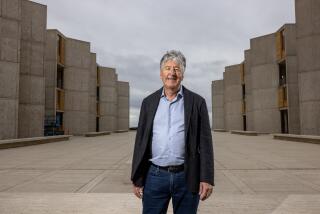Reeve-Irvine Center Marks Second Year
- Share via
SAN JUAN CAPISTRANO — Actor Christopher Reeve and philanthropist Joan Irvine Smith on Sunday marked the second year of their partnership in fighting spinal cord injuries and honoring pioneers in that field.
“I now go to the mailbox every day to see if somebody else wants to fork over another million bucks,” Reeve said with a smile during the Oaks International equestrian competition at Smith’s sprawling ranch outside San Juan Capistrano.
Reeve’s appearance at the Oaks International last year was his first at an equestrian competition since a riding accident in 1995 left him paralyzed.
During a break at Sunday’s event, he presented the second annual Christopher Reeve Research Medal to a neuroscientist of the Salk Institute for Biological Studies in La Jolla. Smith added a $50,000 prize for professor Fred H. Gage for his work on cell regeneration after brain and spinal cord injuries.
“He’s one of the champions of the cause and someone we’re going to rely on very heavily in the future,” Reeve said.
Gage said he is working on cloning cells from various sources and engineering them so that, when they are introduced into the human body, they can bridge broken nerve-cell connections that cause paralysis. He said, however, that research is a slow process, in which scientists build incrementally on the work of those before them.
Smith, a lifelong horsewoman, said she was impressed when Reeve never blamed his horse for the accident that paralyzed him. After that incident, she sought him out and pledged $1 million to help create the Reeve-Irvine Research Center at UC Irvine to study trauma to the spinal cord and ailments of the central nervous system, including stroke, multiple sclerosis, Alzheimer’s disease and Parkinson’s disease.
She and Reeve dedicated the Research Center on Friday.
Smith said the riding community has been especially supportive of the research. Last year’s Oaks International raised about $500,000 for the center.
“They look at Christopher and think, ‘There but for the grace of God go I,’ ” Smith said. “I’ve broken my lower back on a horse. It’s very painful. These things can happen in a second.
“When you ride or are physically active in sports--or drive, ride a bicycle or a motorcycle, or surf--this could happen to anybody. You could fall down the stairs,” she said.
More than 250,000 Americans have spinal cord injuries, said Dr. Thomas Cesario, dean of the UCI College of Medicine. And though recent advances have made researchers hopeful, trying to reverse spinal cord injuries is a daunting task.
“How many people have you known that were paralyzed and have ever walked again? The answer is zero,” Cesario said.
“I don’t think anybody’s going to make a pill that you take and you go to bed paralyzed and you wake up and you’re ready to play for the Rams,” he said. “It’s going to be a series of steps.”
Reeve has emerged at an opportune time as a highly visible spokesman for those with spinal cord injuries, said Bob Yant, 46, a board member of the American Paralysis Assn. The role has coincided with several advances in research, and Reeve’s advocacy has helped raise awareness and money to push those advances even further, said Yant, who has used a wheelchair since he hit a sandbar while diving into the ocean off Newport Beach 16 years ago.
“He’s been so wonderful for our cause,” he said of Reeve. “One man’s tragedy is a gain for the field. He’s really turned it around into an incredibly positive thing.”
More to Read
The biggest entertainment stories
Get our big stories about Hollywood, film, television, music, arts, culture and more right in your inbox as soon as they publish.
You may occasionally receive promotional content from the Los Angeles Times.










